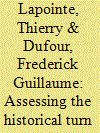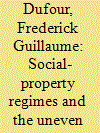| Srl | Item |
| 1 |
ID:
111594


|
|
|
|
|
| Publication |
2012.
|
| Summary/Abstract |
This article reassesses what is at stake in the historical turn in international relations (IR) and the attendant debate between the Second Wave of neo-Weberian historical sociology (WHS) and Political Marxism (PM). Firstly, it endeavours to recast what is at stake in the 'historical turn' in IR: the critique of reification and chronocentrism. Secondly, it examines WHS's argument against reductionism in the light of Weber's own work. We show how the Weberian dualism between the politics and the economics inhibits its capacity to complete its project of historicizing IR. Finally, it explains why recent Weberian's defence of multicausalism creates even more obstacles on the road towards an ontologically consistent historical turn.
|
|
|
|
|
|
|
|
|
|
|
|
|
|
|
|
| 2 |
ID:
079907


|
|
|
|
|
| Publication |
2007.
|
| Summary/Abstract |
Concepts like `nation', `society', and `culture' name bits and threaten to turn names into things. Only by understanding these names as bundles of relationships, and by placing them back into the field from which they were abstracted, can we hope to avoid misleading inferences and increase our share of understanding. (Wolf, 1997: 3)
Theories of International Relations have often shied away from apprehending the historicity of modern nationalism. Inversely, theories of nationalism have not spent much time theorizing the inter-national. The analysis of the relationships among social relations, international orders and nationalism has fallen in the cracks between the field of IR and the field of comparative nationalism. In the context of a renewal of interest for the historical sociology of the international, the analysis of these relations remains of particular relevance. In this article, the author builds on Benno Teschke, Justin Rosenberg and Hannes Lacher's theorization of modern sovereignty, capitalism and the uneven and combined development of International Relations to recast the socio-historical conditions of emergence and diffusion of the modern national form
|
|
|
|
|
|
|
|
|
|
|
|
|
|
|
|